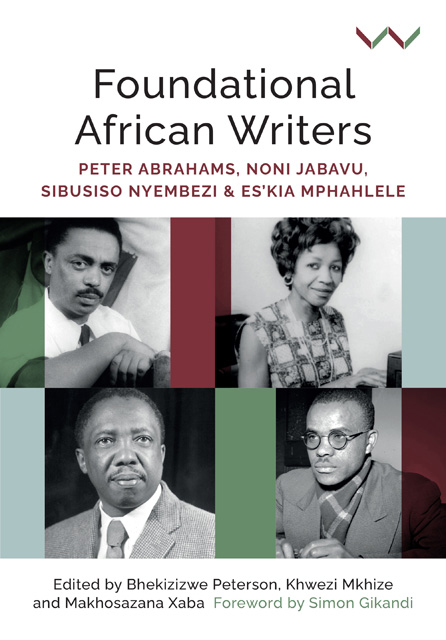Book contents
- Frontmatter
- Contents
- List of illustrations
- Foreword
- Acknowledgements
- Tribute to Professor Bhekizizwe Peterson
- Introduction
- Part I Remapping and Rereading African Literature and Cultural Production
- Part II South Africa and Fugitive Imaginaries
- Part III In the Eye of the Short Century: Diaspora and Pan-Africanism Reconsidered
- Contributors
- Index
12 - Es’kia Mphahlele and the Question of the Aesthetic
Published online by Cambridge University Press: 01 September 2022
- Frontmatter
- Contents
- List of illustrations
- Foreword
- Acknowledgements
- Tribute to Professor Bhekizizwe Peterson
- Introduction
- Part I Remapping and Rereading African Literature and Cultural Production
- Part II South Africa and Fugitive Imaginaries
- Part III In the Eye of the Short Century: Diaspora and Pan-Africanism Reconsidered
- Contributors
- Index
Summary
Towards the end of his first memoir, Down Second Avenue, Es’kia Mphahlele writes about the allure of exile set against the inhibitions that South African segregationism and apartheid had placed on his ongoing struggles for selfassertion as a man and an intellectual. In these latter pages of the book we see the emergence of Mphahlele as a literary critic. And in his second memoir, Afrika, My Music, his recollections of his years at Drum magazine in the 1950s are unassumingly peppered with his first substantial foray into literary criticism. ‘In 1956,’ he writes, ‘I began research for a thesis which I was going to present for the M.A. degree in the University of South Africa. My subject was The Non-European Character in South African English Fiction.’Although it first appeared as his master’s dissertation in 1956, ‘The Non-European Character in South African English Fiction’ also features in Down Second Avenue.
The temporal and spatial gap that lies between ‘The Non-European Character in South African English Fiction’ and The African Image (a revised edition of the book was published in 1974) marks substantial transformations in Mphahlele’s literary and intellectual odyssey. Along with the writings of Peter Abrahams, Bloke Modisane and others, his first substantial work, Down Second Avenue, would emerge amongst a corpus of works giving the outside world a glimpse of the textures of black life under the most persistent colonial state in Africa. Perhaps because the autobiographical form has been read as a ‘peculiar genre’ that ‘depicts the very social conditions that have given rise to it’ and as ‘South Africa’s most singular contribution to black literature’, Down Second Avenue arguably holds pride of place in the corpus of Mphahlele’s writings. Indeed, the works of Abrahams, Mphahlele and Alex La Guma acquired something of a canonical status in the education of a generation of those on the continent who came of age in the wake of independence in the 1960s and 1970s, without any immediate access to the lived realities of apartheid.
- Type
- Chapter
- Information
- Foundational African WritersPeter Abrahams, Noni Jabavu, Sibusiso Nyembezi and Es'kia Mphahlele, pp. 259 - 278Publisher: Wits University PressPrint publication year: 2022

